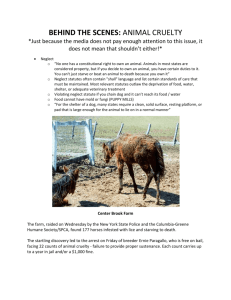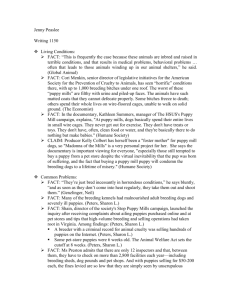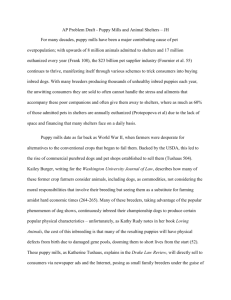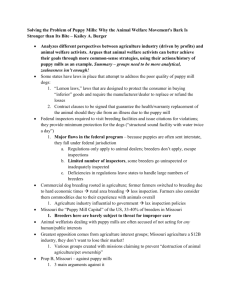FACT: "Madonna of the Mills" focuses on the activities of Laura, a
advertisement
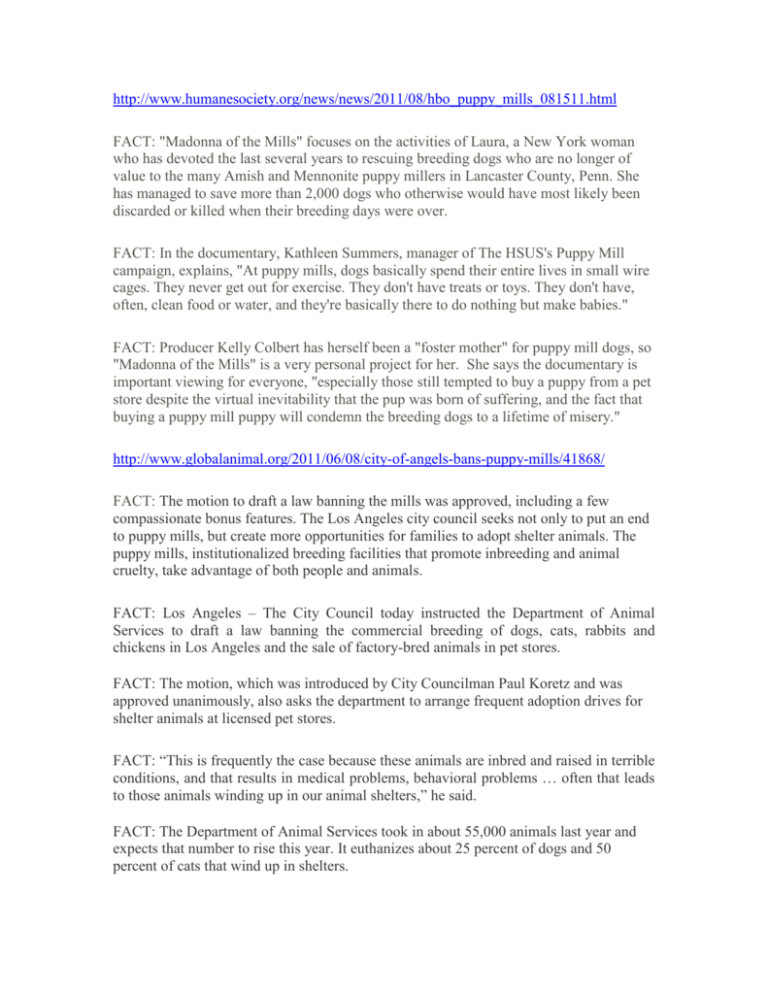
http://www.humanesociety.org/news/news/2011/08/hbo_puppy_mills_081511.html FACT: "Madonna of the Mills" focuses on the activities of Laura, a New York woman who has devoted the last several years to rescuing breeding dogs who are no longer of value to the many Amish and Mennonite puppy millers in Lancaster County, Penn. She has managed to save more than 2,000 dogs who otherwise would have most likely been discarded or killed when their breeding days were over. FACT: In the documentary, Kathleen Summers, manager of The HSUS's Puppy Mill campaign, explains, "At puppy mills, dogs basically spend their entire lives in small wire cages. They never get out for exercise. They don't have treats or toys. They don't have, often, clean food or water, and they're basically there to do nothing but make babies." FACT: Producer Kelly Colbert has herself been a "foster mother" for puppy mill dogs, so "Madonna of the Mills" is a very personal project for her. She says the documentary is important viewing for everyone, "especially those still tempted to buy a puppy from a pet store despite the virtual inevitability that the pup was born of suffering, and the fact that buying a puppy mill puppy will condemn the breeding dogs to a lifetime of misery." http://www.globalanimal.org/2011/06/08/city-of-angels-bans-puppy-mills/41868/ FACT: The motion to draft a law banning the mills was approved, including a few compassionate bonus features. The Los Angeles city council seeks not only to put an end to puppy mills, but create more opportunities for families to adopt shelter animals. The puppy mills, institutionalized breeding facilities that promote inbreeding and animal cruelty, take advantage of both people and animals. FACT: Los Angeles – The City Council today instructed the Department of Animal Services to draft a law banning the commercial breeding of dogs, cats, rabbits and chickens in Los Angeles and the sale of factory-bred animals in pet stores. FACT: The motion, which was introduced by City Councilman Paul Koretz and was approved unanimously, also asks the department to arrange frequent adoption drives for shelter animals at licensed pet stores. FACT: “This is frequently the case because these animals are inbred and raised in terrible conditions, and that results in medical problems, behavioral problems … often that leads to those animals winding up in our animal shelters,” he said. FACT: The Department of Animal Services took in about 55,000 animals last year and expects that number to rise this year. It euthanizes about 25 percent of dogs and 50 percent of cats that wind up in shelters. http://tv.nytimes.com/2009/04/27/arts/television/27pupp.html?_r=2 FACT: “Puppy Mills,” an episode of “Animal Cops: Philadelphia” having its premiere Monday on Animal Planet, spends much of its time detailing a raid last year at Limestone Kennel in Lancaster County, Pa., where the Pennsylvania Society for the Prevention of Cruelty to Animals found almost 90 dogs living in conditions that more than justify the “viewer discretion” warning at the beginning of the program. FACT: “They’re just bred incessantly in horrendous conditions,” he says bluntly, “and as soon as they don’t come into heat regularly, they take them out and shoot them.” http://www.nytimes.com/2009/08/18/us/18dogs.html FACT: At the Almost Heaven kennel, a commercial dog breeder in Emmaus, Pa., more than 200 dogs lived in wire-floored cages and suffered from matted fur, ear infections and mange because of dirty conditions and a lack of veterinary care, according to state officials. FACT: After reports from a former employee about inhumane conditions at the kennel, the owner, Derbe Eckhart, lost his state license. The kennel continued to operate, however, and in June, state officials shut it down and moved 218 dogs to temporary shelters. FACT: The action represented the largest closing so far under a 2008 law intended to crack down on what critics say are cruel conditions in hundreds of commercial kennels that have given Pennsylvania a reputation as the “puppy mill” capital of the East. FACT: In July, a kennel in Tioga County was shut down because dogs were kept in unsanitary conditions. Eighteen dogs were taken to animal-rescue centers, and the owner was cited for 57 violations of the law. FACT: Since last December, officials have revoked or refused 11 kennel licenses, and they are in the process of revoking three more. Before the 2008 law was passed, officials had already stepped up efforts to regulate the kennels, revoking 41 licenses in 2007 and in early 2008, compared with only 3 in 2006. FACT: The law increases minimum cage sizes, requires veterinary care and exercise periods, and bans wire flooring, all changes that take effect in October. Provisions that allowed the closing of the Emmaus kennel are already in effect. http://www.kcci.com/r/22526310/detail.html FACT: Iowa ranks third in the number of puppy mills, and second in the number of puppies sold with more than 74,000 purchased per year. FACT: In Iowa, there are some 100,000 puppies right now being bred to be sold. About half the breeders are licensed by the state, while the other half are licensed by the USDA. Federal inspectors are currently allowed inside USDA-licensed businesses but Iowa law does not allow state inspectors inside the federally licensed facilities. FACT: LaHay said in 2007 -- the USDA cited 59 percent of its Iowa breeders with violating the animal welfare act. FACT: Rep. Jim Lykam tried and failed for 2 years to get puppy mill legislation passed. "We're looking at going after the bad actors and unlicensed ones," Lykam said. The bill would raise yearly fees for breeders to $175. http://articles.latimes.com/2004/jul/26/local/me-puppies26 FACT: SAN DIEGO — Smugglers are flooding the Southern California pet market with disease-ridden puppies from Mexico, prompting law enforcement crackdowns, raising public health concerns and breaking the hearts of owners who watch their dogs die, often within hours of buying them. Animal control officials estimate that hundreds, perhaps thousands, of puppies have died since an underground market, stretching from puppy mills in Mexico to street corners in San Diego and Los Angeles, was uncovered last year. http://www.usatoday.com/news/nation/2007-10-31-puppy-mills-strip_N.htm FACT: Bucolic Virginia is quietly poised to become one of the nation's pre-eminent puppy mill states, according to a months-long investigation to be released today. Investigators for The Humane Society of the United States found more than 900 dog breeders "churning out puppies" from massive barns, trailers, sheds and backyard cages in "deplorable" conditions, according to the white paper chronicling the findings. FACT: Shain, director of the society's Stop Puppy Mills campaign, launched the inquiry after receiving complaints about ailing puppies purchased online and at pet stores and tips that high-volume breeding and selling operations had taken root in Virginia. Among findings: •A breeder with a criminal record for animal cruelty was selling hundreds of puppies on the Internet. •Some pet-store puppies were 6 weeks old. The Animal Welfare Act sets the cutoff at 8 weeks. •Many of the breeding kennels had malnourished adult breeding dogs and severely ill puppies. Under federal law, breeders with more than three breeding females must be licensed — and subject to inspections — if they sell animals to pet stores. Many Virginia pet-store suppliers are ignoring that and operating without licenses, Shain says; many other breeders are bypassing it by selling directly to consumers. The society will send its findings today to federal and local authorities. CLAIM: The society believes as many as 4 million puppy-mill puppies are born annually, and states must step in to fill federal-law gaps and oversee large commercial breeders. http://www.cbs12.com/video/v/1171713309001/wpec-localnews FACT: Animal control raided a local breeder with 225 dogs, living in questionable conditions, at a suspected puppy mill near Clewiston. Officials say there was no a/c for the animals and some have skin and eye infections. Peter Schaller reports. CLAIM: Volunteer at the potential puppy mill said they were not neglecting animals. http://articles.latimes.com/1988-08-03/news/mn-6752_1_puppy-mills FACT: SACRAMENTO — Citing "squalid conditions" at Midwestern puppy breeding farms, animal rights groups on Tuesday successfully lobbied the Senate Judiciary Committee to approve a bill that would prohibit bringing into the state puppies under 12 weeks old without their mothers. FACT: The committee, after hearing an hour of emotional testimony from supporters and opponents of the bill, voted 7-1 to, in effect, impose a statewide boycott on so-called "puppy mills" that mass breed dogs in small wire cages, frequently unprotected from the elements. http://www.economist.com/node/17468228 FACT: ODD as it seems, the state of Missouri is home to 1,462 licensed commercial dog breeders. Between them, they breed about 1m puppies a year. About 40% of all the dogs that end up in pet shops across America are born in Missouri’s smaller country towns. FACT: Cori Menkin, senior director of legislative initiatives for the American Society for the Prevention of Cruelty to Animals, has seen “horrific” conditions there, with up to 1,000 breeding bitches under one roof. The worst of these “puppy mills” are filthy with urine and piled-up faces. The animals have such matted coats that they cannot defecate properly. Some bitches freeze to death; others spend their whole lives on wire-floored cages, unable to walk on solid ground. FACT: Animal-rights supporters claim that the laws governing these breeding sheds are vague, unenforceable and insufficient to maintain even the most rudimentary care. This is why they gathered more than 190,000 signatures in support of the Puppy Mill Cruelty Prevention Act—an exercise in direct democracy that was passed on November 2nd to improve conditions in the state’s breeding facilities. FACT: The groups created the ballot initiative after repeatedly failing to get bills passed by the Missouri General Assembly, explains Barbara Schmitz, director of the Missouri branch of the Humane Society. She estimates that licensed premises may account for only half the number of puppy mills in the state. There are probably as many unlicensed ones, adding up to almost 3,000 in all, operating under laws that have not been updated in 18 years. FACT: In 2009 the Missouri Department of Agriculture, which oversees breeders, created a programme called Operation Bark Alert. Under this, individuals can report unlicensed breeders to the state. According to Misti Preston, a spokesman for the department, the initiative has helped rescue more than 3,600 dogs and put 180 unlicensed commercial breeders out of business. FACT: Ms Preston admits that there are only 12 inspectors and that, between them, they have to check on more than 2,800 facilities each year—including breeding sheds, dog pounds and pet shops. And with puppies selling for $50-200 each, the fines levied are so low that they are simply seen by unscrupulous breeders as part of the cost of doing business. FACT: It allows no more than 50 breeding bitches in any one facility. Breeders with more than ten will have to provide sufficient food and clean water, veterinary care, regular exercise and adequate rest between breeding cycles. The amendment also regulates the size of kennels, so that the animals have room to stretch. Any violation of this law will count as a class C misdemeanor, carrying a maximum penalty of up to 15 days in jail and a fine of up to $300, still rather low.


